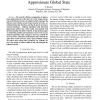Free Online Productivity Tools
i2Speak
i2Symbol
i2OCR
iTex2Img
iWeb2Print
iWeb2Shot
i2Type
iPdf2Split
iPdf2Merge
i2Bopomofo
i2Arabic
i2Style
i2Image
i2PDF
iLatex2Rtf
Sci2ools
113
click to vote
CCR
2006
2006
Efficient and decentralized computation of approximate global state
Abstract-- The need for efficient computation of approximate global state lies at the heart of a wide range of problems in distributed systems. Examples include routing in the Internet, sensor fusion, search in peer-to-peer networks, coordinated intrusion detection, and Top-K queries in streamoriented databases. Efficient algorithms that determine approximate global state could enable near-optimal local decision-making with little overhead. In this position paper, we model this problem and summarize recent work on randomized algorithms that navigate a four-way tradeoff between accuracy, robustness, performance and overhead. Despite these recent successes, many open problems remain. We believe that solving these problems can radically improve the design of robust, efficient and self-managed distributed systems.
Related Content
| Added | 11 Dec 2010 |
| Updated | 11 Dec 2010 |
| Type | Journal |
| Year | 2006 |
| Where | CCR |
| Authors | S. Keshav |
Comments (0)

